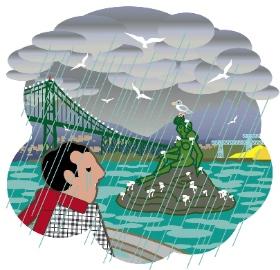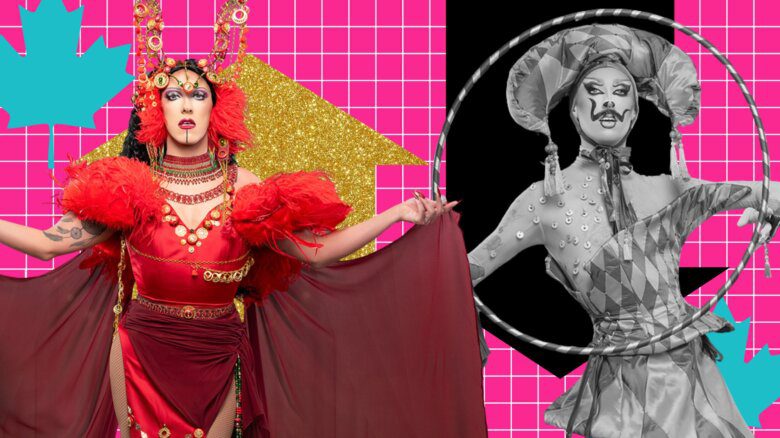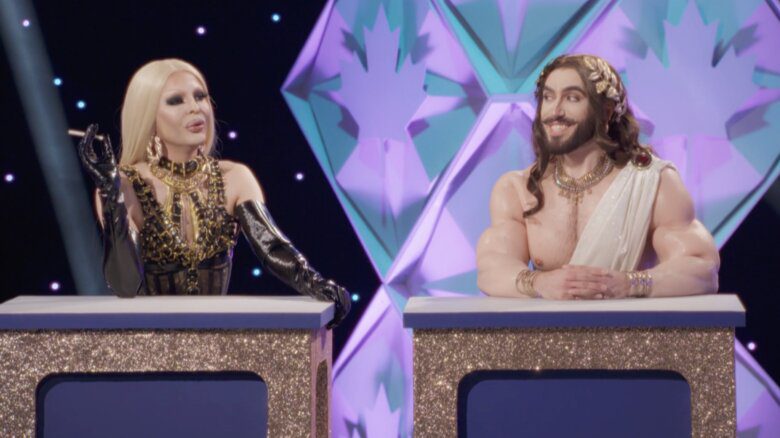It is a little known fact that drag queens and fag hags are the surrogate mothers of queer boys everywhere. They teach us what we never got to learn in home economics: how to boil an egg and sew a button, the difference between washing your clothes in hot versus cold water and the importance of a heavy iron.
Anything Elliot and Megan donated when I moved into the Holly Lodge had been excised in the months I had been hanging out with Elsa. She introduced me to a little box store called IKEA and the housewares department at Eaton’s. I stopped adding water to coffee-flavoured chicory crystals and learned to brew beans from Starbucks in a coffee maker that paused long enough for me to light my first cigarette of the day.
“Is this Star Trek or what?” I asked Elsa in the line at London Drugs to pay for it.
Elsa and I had been thick as thieves ever since she moved into the West End with Donna. Their Chilco St address soon replaced Table 31 as the staff watering hole. It was where you went to drink cheap Chilean chardonnay, bitch about work and play a few hands of UNO. It was also where Elsa pressed me for a sequel to our play.
Donna had commissioned me to write another episode of The Mermaid Café for the second Month of Wednesdays fundraiser. Elsa and I were at odds with the direction to take the story: she wanted to go campy; I wanted to write something serious. The problem being I wasn’t feeling funny.
It had been a brutal winter at the café. Several regulars had not lived to see the spring — would not live to see the Gay Games. Wheelchair Wayne and Leather Michael died within weeks of each other; Bill Monroe buried his roommate. It was not unusual for a regular to start an order with, Did you hear about so and so?
You could see the loss of life in the empty chairs and tables in the evening, and at lunch in the tired faces of the lesbian nurses taking refuge from the nearby AIDS ward, in Blair and Yolanda’s piss and vinegar. I watched men my age turn into skeletons before my very eyes, and with each passing bill I prayed that would not be me.
If you ever need a good place to reflect, I recommend paying the Girl in a Wetsuit a visit. Sitting amongst the rocks in Burrard Inlet, Elek Imredy’s bastardization of The Little Mermaid looked the way I felt: solitary and alone, like someone waiting for her ship to come in.
I strategically planned my visits around Elsa’s work schedule. If she was off I made sure to be as far away from my phone as possible until I could finish the script. I was staring out through my bay window at the traffic on Davie St, blowing smoke over a blank page in my typewriter, when the phone rang. I let the machine answer, assuming it was Elsa calling for a progress report between tables.
“Tony, it’s Donna.” Her voice sounded far off. “I need you to come work. Scooter’s mother just called to tell me he died. I need to let Dex know, but he’s working…” Her voice broke and I grabbed the phone immediately.
“I’ll be there as soon as I can.”
My mind flashed back to the morning when Scooter raced me to the Elbow Room for breakfast and hugged the corners in Stanley Park with the top down on his car. I envisioned him in a dress, lying on a table after he locked himself out of his house after the staff Christmas party. I could taste my tears as I started to laugh. I hadn’t seen him in so long, but it was so hard to believe he was gone forever.
Dex, Spike and Elsa were bewildered when I arrived at the café for work. “You don’t start for another three hours,” Elsa said, looking at the neon clock above the bar. She knew my schedule better than I did.
“Um… I’ve been cooped up in the apartment all afternoon. I thought I would come by and read the paper and smoke for a while.”
“How’s the script coming?” Elsa asked.
“It’s coming,” I lied.
Dex wasn’t buying it. “Something is wrong. You’re not telling us something.”
“Can I talk to you for a second in the crow’s nest?” Donna asked Dex, putting her hand gently on his shoulder the way she did when she wanted you to work a double.
“Am I being fired?” he asked.
“Just come with me.”
Once they were gone I got up from the tiny table under the traffic light and signed in to the computer. “What’s this about?” Spike asked. I assumed Donna would have at least told Spike. And then we heard Dex’s sobs coming from Donna’s office.
“Scooter died,” I whispered.
Spike’s face went white. There was not merely sorrow in his eyes, but mortal fear, like something was coming to get him. “I gotta call Kitty,” he said.
The customers looked concerned. Tippy Ladders craned her ear in our direction, trying to catch a whiff of our whispers. We could hear Dex race down the stairs from the crow’s nest and the green metal door slam behind him. Not long after the distinct smell of skunk wafted through the bamboo blinds of Donna’s office.
Anyone who had dinner at Doll & Penny’s that evening was served by the longest faces the hospitality industry had ever seen, provoking several regulars to ask, “Who died?”
“Scooter,” we would respond.
Dan managed the dinner shift that night. After a few post-shift rounds of beer at Table 31 he came back with me to my apartment. We snuggled up in bed, our faces stencilled in the darkness by the moon’s reflection off the silver-painted fire escape outside my bedroom window. We had not cuddled like this in almost year.
“I’m afraid, Dan.”
“Of what this time?”
“Of dying of AIDS.”
“Have you ever been tested?”
“No. You?”
“No. But if you’re so afraid you have it, maybe you should.”
“What if it comes back positive? I would drive myself to an early grave with worry. I can hardly breathe, discussing it now.”
“Don’t talk about it then,” Dan said, rubbing my shoulder, exfoliating the skin with his callused hands.
“Why haven’t you been tested?” I asked him. “You’ve been at this a lot longer than I have.”
“I don’t believe in getting tested. I’m not even sure I believe in AIDS.”
“Not this again…”
“Whatever, Tony… what I believe is beside the point. But for right now, I would rather enjoy living my life in ignorant bliss,” Dan said. “Your time is up when your time is up, whether it’s AIDS or I decide to kill you.”
“You sure know how to comfort a guy.”
Whether Dan believed in such a thing as AIDS or not, Scooter’s death was the impetus for me to get my first AIDS test.
***
There were two wakes for Scooter: the one in the church rectory and the one at Doll & Penny’s. Given his druthers I’m sure Scooter would have attended the latter.
As was their way, Papa and Mama Ed (at Donna’s urging) opened the back half of the café and the bar to Scooter’s family and friends. What should have been a sombre occasion fast became a reunion of former Doll & Penny’s staff — men I had seen only in photographs in the albums above the accounting desk. The proceedings did not become solemn until the lesbian nurses from St Paul’s Hospital arrived.
The only thing standing between Vancouver’s gay male population and certain death were the lesbian nurses at St Paul’s. The gay men who went there for treatments or to visit a dying friend bowed before their Daytons. For them to attend a wake was an honour bestowed on very few, in light of the number of men they watched die. Or maybe they were looking for a free meal. Who knows? We were just glad to see them.
Scooter’s wake fell right in the middle of the week I was waiting for the results of my AIDS test. I chain-smoked and drank nothing but coffee and wine, paying the Girl in a Wetsuit visits on a daily basis. It was there I came up with an idea for a sequel to The Mermaid Café.
“It’s moving,” Elsa said, when she was done reading the script I had written.
“Thanks.”
“But it needs more camp. It’s not The Mermaid Café without the camp.”
“It’s bittersweet. We’re Canadian; we thrive on bittersweet.”
“Let’s get a second opinion,” Elsa said.
Donna read the script and said, “It’s a little on the heavy side, don’t you think? I know we’re having an AIDS fundraiser, but we sort of want to get people’s minds off that, you know?”
Now that they were roommates, it was hard to take anything Donna said about Elsa at face value. There were rumours they were having a lesbian affair, but I found that hard to believe. Elsa loved dick too much. I took the script to Dan and asked him for his opinion.
“Too heavy,” he said. “Don’t get me wrong — I know where you’re coming from, but you can still be sentimental and funny. I think people want that right now. It’s what Doll & Penny’s needs.”
“This fucking script!”
“It’s only a first draft.”
“I wish I’d never committed to this. I don’t know what it is. The first time I did it, I could hear Elsa saying the words, but now… they aren’t there.”
“Maybe the problem is you need to start writing as a gay man.”
Dan was right. I had been trying to write from the point of view of a straight woman because I thought I had a better chance of making a living as a writer that way. I would go to Little Sister’s bookstore and look at all the gay novels and think about how all those writers were relegating themselves to obscurity. I collect those books now. They are the paper trail of our existence.
“This probably wasn’t a good time to get an AIDS test, either,” I added.
“You think? You may want to postpone getting the results for a while,” Dan warned. “If you think you have writer’s block now, what are you going to do if you find out you have AIDS?”
There was an atmosphere of vulnerability in the café with Scooter’s passing. Even Blair and Yolanda were not their usual bitchy selves. A customer would try to provoke them into one of their histrionic tirades, but they would wave them off like flies. The manager’s book detailed only what was necessary, as opposed to the absurd. Were it not for the influx of new staff hired for the Gay Games, the café would have been mired in gloom.
Prudence, the big-mouthed busboy who announced that Dante was HIV-positive to Davie St, had been promoted to graveyard waiter. There was Ollie, a longhaired hippie who once served me a beer at the Livingwell Café in Toronto while I was still underage. Josie had recently immigrated to Vancouver from Winnipeg. Chakra and Elvis were forever at home on the graveyard.
It would take two more drafts of the script before I satisfied Elsa. In the end, the pseudonymous Elsa would receive an unexpected visit from a younger sister who had disappeared from home after graduating from high school. The sister is afraid there would be no future left for her once she had finally got her shit together. It was a sentiment echoed by many of us that worked and ate at Doll & Penny’s.
The second Month of Wednesdays was more polished and professional than the first — as well as more popular. Once again, Bill Monroe hosted, and once again, he mangled as many standards as one could between sets of professional entertainers. The audience gave him a standing ovation as always.
My doctor was on vacation when I finally went to get the results of my AIDS test. His substitute asked me what was the nature of my visit.
“To find out if I have AIDS.”
“Oh,” he said. “I wish someone had told me.”
The young doctor took a deep breath and opened my file, half squinting at my lab results like they were a scary movie. His face relaxed.
“I’m happy to say you’re non-reactive.”
“WAH-HOOO!” I shouted, loud enough for the people in the waiting room to hear. I ran out of the office and straight to the café, kicking my heels along the way. It was mid-afternoon and nearly empty. Donna was sitting at Table 31 working on something.
“I’m negative, I’m negative!” I told her.
“Well of course you are,” she said.
“No! I mean I don’t have AIDS!”
“Well that too!”
“What are you doing?”
“Framing a photo of Scooter from the Christmas party a couple of years ago.” She held up the picture for me to see. Scooter was in his deranged Baby Jane drag, flanked by Blair and his partner Michael in their B52 wigs.
“That was a great party,” I said.
“It was.”
“I just wish he had said one last goodbye,” Donna said without looking up from what she was doing.
“So do I.”
Donna placed the picture on the mantle above Table 31 and pressed two fingers to Scooter’s face through the glass. She put her arm around my shoulder paternally, and we stood there admiring the photo. The café seemed to stand still in spite of the disco that rocked the house.
“How old was he?” I asked.
“Twenty-seven.”
When I was 21, that seemed kind of old, but today, at 43, it makes me shudder to think I outlived Scooter by 20 years.

 Why you can trust Xtra
Why you can trust Xtra


